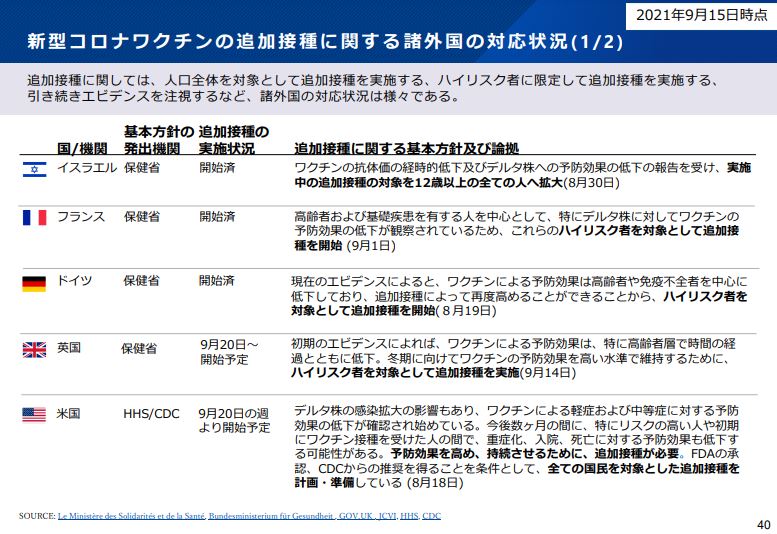
Release date: 2021.09.28
The vaccine is expected to be a trump card against the new coronavirus infection, but against the background of the epidemic of the delta strain, which is a highly contagious mutant virus, after completing two vaccinations and acquiring immunity, the new corona will be infected. The number of reported cases of "breakthrough infection" is increasing. We have summarized the causes and countermeasures for infection after vaccination is completed.

From the materials of the 24th Health Science Council Immunization and Vaccine Subcommittee (September 17, 2021)
Infectious diseases can be divided into two types. One is a type such as measles or chickenpox that cannot be repeated once infected. The other is a type that takes many times, such as the new corona and influenza. In the former type, after the virus invades the mucous membranes of the nose and throat, it multiplies in nearby lymph nodes before entering the bloodstream and spreads throughout the body. For this reason, there is a relatively long incubation period from infection to onset. If the incubation period is long, even if the amount of antibody decreases, the virus invasion stimulates the body to shift to a system of increasing antibody production, and by the time the virus enters the blood, a sufficient amount of antibody is produced to prevent the onset of the disease.
On the other hand, in the latter type, viruses that invade mucous membranes such as the nose and throat quickly multiply in those areas. Immune cells that react to the virus produce antibodies, but if the virus proliferates at a faster rate, it becomes difficult to prevent the onset. However, with the passage of time, a sufficient amount of antibody is produced, preventing the onset of pneumonia and reducing its severity.
The risk of breakthrough infection is thought to increase as time passes after completing the second dose of the corona vaccine. For example, research results show that half a year after completing two doses of Moderna's vaccine, the neutralizing antibody that prevents infection decreases to less than one-fourth.
The delta strain epidemic is behind the increase in breakthrough infections. The delta strain is considered to be a virus with strong infectivity and rapid multiplication. And it is known that it reduces the vaccine effect more than the conventional strain. Pfizer and Moderna vaccines were more than 90% effective in preventing infection and onset, but in Israel, the effect has decreased to over 60% since they were replaced with the Delta strain. It has been reported that the neutralizing antibodies of breakthrough-infected individuals were lower than those of non-infected individuals, and it is believed that the decrease in neutralizing antibodies is related to the risk of infection.
According to a survey by Osaka Prefecture, of the 85,325 new infections between March and August this year, 0.4% (317 people) were breakthrough infections, and half of them were over 60 years old. There were no fatalities or serious injuries. Meanwhile, in the United States, data from the U.S. Centers for Disease Control and Prevention (CDC) shows that about 25% of the approximately 43,000 COVID-19 patients confirmed in Los Angeles County between May and July this year had breakthrough infections. increase. However, 3.2% were hospitalized and 0.05% were treated in the ICU, and the severity of the disease was suppressed. By contrast, voluntary reporting data from U.S. states showed that as of September 13, 2013, there were 15,790 reported hospitalizations or deaths due to breakthrough infections, with approximately 70% of those hospitalized at age 65. As mentioned above, 87% of deaths were in people aged 65 and over.
Under these circumstances, there are high expectations for a "booster effect," in which even if the vaccine loses its effectiveness over time, a third additional vaccination while the antibodies remain in the body will increase the effectiveness again. The 3rd dose of Pfizer's vaccine is said to increase the neutralizing antibody titer against the delta strain by more than 5 times in young people and by more than 11 times in elderly people compared to only 2 doses. Two weeks after the Moderna booster vaccination, the neutralizing antibody titer increased approximately 42-fold compared to six to eight months after the second vaccination.
A study by the Israeli Ministry of Health found that a booster dose of the Pfizer vaccine in people over the age of 60 reduced the risk of infection by up to 11 times and the risk of severe disease by up to 10 times compared to two doses. It is accepted to become Based on these research results, Israel, the United Kingdom, France, Germany, etc. have already implemented a third additional vaccination, and the United States is planning to start a booster vaccination soon. In the UK, in addition to high-risk people such as medical and nursing care workers and residents of nursing homes, all citizens over the age of 50 are also eligible, and a third dose is permitted after half a year from the completion of all two doses. Japan has also recently established a policy to administer the third vaccination. Basically, the same vaccine as up to the second time should be used, and it is recommended to wait at least 8 months after the second vaccination. We will consider the target in the future, but it is expected that the medical workers who started the advance vaccination in February will be vaccinated as early as December.
About side effects after booster vaccination Overseas, Pfizer's vaccine is "similar or less frequent than the second vaccination", Moderna is "more than half of the side reactions are mild or moderate", AstraZeneca's It is said that "it was less than after the first vaccination".
Meanwhile, World Health Organization (WHO) experts say there is no evidence that the third dose of the Covid-19 vaccine is significantly less effective in preventing severe disease, and that the current number of doses is sufficient. An opinion paper is published in The Lancet this month.
MEDIUS Group is developing a business centered on the sale of medical equipment. We (Medical + us) involved in medical care also want to play the role of an information source (Media) that delivers useful information for the medical field and people's healthy tomorrow.